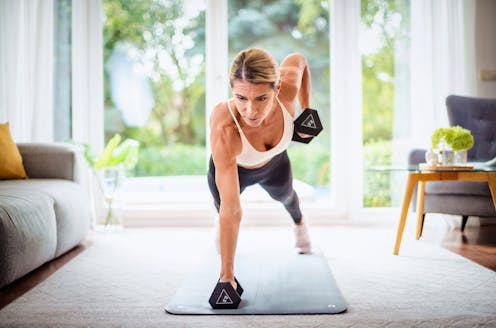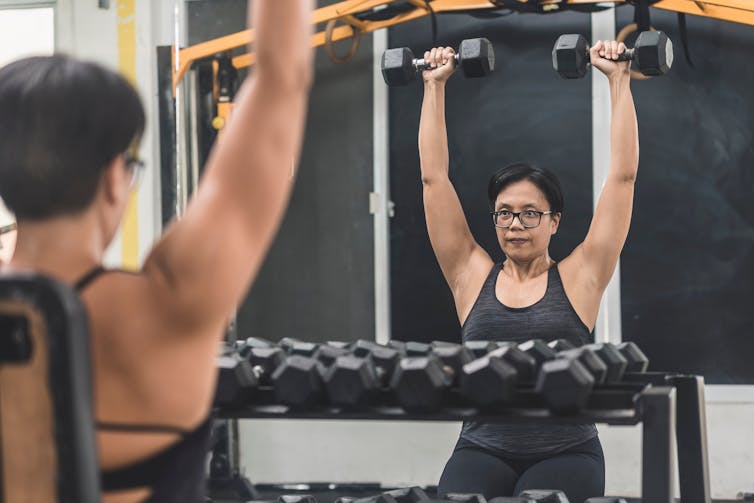
Many women begin experiencing symptoms of the menopause around age 50. As hormones begin to fluctuate and change, women might start experiencing a range of symptoms, such as hot flushes, joint pain, low mood and vaginal dryness. The menopause can also be accompanied by a range of physical changes too – including loss of muscle mass, loss of bone density and a slowed metabolism.
Fortunately, regular exercise – specifically weightlifting – can help mitigate these changes somewhat and improve overall health and wellbeing. Here are just some of the ways weightlifting can be beneficial to women going through the menopause.
1. Increases bone density
Not only does weightlifting challenge your muscles, it also challenges your bones. In fact, resistance exercises (such as weightlifting) are shown to stimulate the formation of new bone tissue, which can increase bone density.
This may be particularly beneficial to women who are postmenopausal and at risk of osteoporosis (brittle bones). Research has shown women who regularly resistance train had significant increases in bone mineral density, including in the hip and spine. Greater bone density may also reduce the risk of osteoporosis.
2. Maintains muscle mass
As women age, they tend to lose muscle mass and strength, which can increase the risk of falls, fractures and injury. The menopause may contribute to this loss of muscle mass.
But research shows that weightlifting is an effective way for older adults – including women – to maintain and even increase their muscle mass and strength. For postmenopausal women, research has shown that those who participate in regular resistance training are less likely to experience losses in muscle mass and strength compared to those who participate other forms of exercise, such as stretching and mobility.
Other research has also found that weight training may be beneficial for women in the perimenopause period, too. The study found that perimenopausal women who regularly weight trained – as opposed to doing standard aerobic exercise (such as running or walking) – over a two-year period gained around three times less stomach fat on average.
3. Boosts metabolism
Weightlifting can increase lean muscle mass, which in turn can help boost metabolism and burn more calories at rest. This can be especially important for women just before and after the menopause, as hormonal changes can lead to a decrease in metabolism and an increase in body fat.

In one study published in the Journal of Strength and Conditioning Research, postmenopausal women who participated in a 12-week resistance training programme had significant increases in resting metabolic rate which can help to manage excess weight gain.
4. Improves mood
Women going through the menopause may experience mental health issues, including depression and anxiety. But exercise – including weightlifting – may have numerous benefits for mental health, including reducing symptoms of depression and anxiety.
One study found women who participated in a 16-week combined resistance training programme reported improved mood and emotional wellbeing when compared to a programme which only included guidance on a healthy lifestyle. Furthermore, self-esteem, mood and fatigue have also been shown to improve following prescribed resistance training in older adults – suggesting weightlifting can have a positive effect on quality of life. Although this particular study wasn’t conducted on menopausal women specifically, it’s likely exercise may have a similar effect.
Women who experience disturbed sleep and hot flushes may also experience reduced quality of life and mood. But resistance training is shown to be an effective tool in regulating body temperature, which may improve emotional wellbeing.
The effects of weightlifting on mood may be due to the release of endorphins, which are natural painkillers and mood-boosting chemicals in the brain.
Getting started
Given how many benefits weightlifting can have for women going through this period of their lives, you may be eager to get started. But if you’ve never tried resistance training or weightlifting before, here are a few things to bear in mind:
- Start with a qualified trainer: Working with a qualified personal trainer or strength and conditioning coach can be beneficial especially right at the start of your fitness journey. They can help you learn proper lifting techniques, establish a safe and effective exercise programme and progress at a pace that’s appropriate for your fitness level and goals.
- Focus on form: Proper form is crucial when lifting weights, especially as you age. Poor form can increase your risk of injury and prevent you from seeing the benefits of weightlifting. Take the time to learn proper technique and start with lighter weights until you feel comfortable and confident. Using a mirror or videoing yourself during workouts can help ensure your form is good.
- Start with compound exercises: Compound exercises are exercises that work multiple muscle groups at once. These exercises are great for building overall strength. Some examples include squats, deadlifts and bench presses. Try doing these around 2-3 times a week. Once you have a good foundation of these compound exercises, start to include exercises which focus on one specific muscle or work to help stability – such as shoulder press or lunges.
- Progress gradually: As you become more comfortable with weightlifting and feel the weights you’re lifting aren’t as challenging as they used to be, you can gradually increase the weight or intensity of your workouts for progression. Just be sure not to progress too quickly, as this may increase your risk of injury.
Weightlifting can have many benefits – and doing it consistently may help you maintain good physical and mental health not only before and after the menopause, but as you get older too. Just be sure to consult your healthcare provider before starting any new exercise programme, especially if you have pre-existing health conditions or concerns.
The authors do not work for, consult, own shares in or receive funding from any company or organisation that would benefit from this article, and have disclosed no relevant affiliations beyond their academic appointment.
* This article was originally published at The Conversation
PUBLISH WITH US!
The Washington Gazette works at our discretion with businesses, non-profits, and other organizations. We do not work with socialists, crony capitalists, or disinformation groups. Click the green button below to view our services!
HELP STOP THE SPREAD OF FAKE NEWS!
SHARE our articles and like our Facebook page and follow us on Twitter!





0 Comments